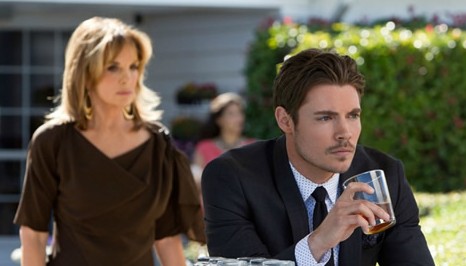

But “Dallas” was never designed to inspire so much as to haunt. Unlike the Carringtons, who were always dashing off to overseas business meetings or throwing glitzy events or calling their brokers to sell stock, the Ewings were slow-moving, repeated themselves often and had an unmatched tolerance for long, uncomfortable silences. They certainly didn’t have glamorous problems: Sue Ellen was an alcoholic, Lucy popped pills and slept around, Jock was an overbearing patriarch and Bobby was a little brother with an inferiority complex. Although its characters may have been preoccupied by the oil business, “Dallas” was mostly about struggling to maintain your identity — not to mention your sanity — within the suffocating confines of the middle-American family.

Those interminable scenes in the den at Southfork, in which the whole clan gathered to toss back drinks, their elbows always brushing past plants or nearly knocking over lamps, their bodies always shifting uncomfortably in their armchairs, captured the airless prison of dysfunctional kinship.
While Blake jetted off to

Whether Bobby and J. R. were feeling affectionate or angry, they referred to their parents as and Anyone who would dare to insult Jock or Miss Ellie could expect a sock to the jaw. Defectors were reminded repeatedly that without their family identity, they were nothing. “Despite our differences, Bobby, you’re still a Ewing,” Jock told Bobby through gritted teeth when Bobby tried to leave Southfork at the end of Season 3. “We’ve only got each other. We’ve got to stick together.”
From the first moments of TNT’s “Dallas” remake (or “continuation,” because the show picks up 20-odd years after the original story left off), something is askew. It isn’t just the sudden, verdant lushness of Southfork, which in the old days always had the flat, yellowing look of a place you would never want to get stuck. It isn’t the bland,

When we witness J. R.’s son John Ross and his girlfriend, Elena, whooping it up over newly discovered oil, or we see Bobby’s son Christopher chatting excitedly about the promise of methane drilling while pacing back and forth in his pristine office loft, the contrast becomes especially clear: These younger Ewings are all about action and entrepreneurship, about seizing the day and making a name for themselves in the wider world outside.
In fact, this extreme-makeover version of “Dallas” could take place anywhere on the globe; call the show or “

Maybe that old Ewing game of outsiders and insiders, of us against them, of loyalty and closed-minded allegiance, was too specific a product of the patriotism and white-man’s-burden supremacy of Reagan’s America to reproduce for the

The show’s writers may have flirted with J. R.’s suicide as the ultimate cliffhanger to round out the series in 1991, but self-destruction was never his thing; he was all about backslapping sadism. There was always something familiar about J. R., the way he couched his overconfidence and malice in the relaxed, folksy wisdom of the country boy. Even when he was outnumbered, he never felt outmatched, and the more power he had, the more sure he felt that power was his birthright. Or, as
This flavor of swagger isn’t as common today, outside Kanye albums and certain self-promotional

Even the campaigns against littering (“Don’t Mess With Texas!”) felt a little menacing, faintly mimicking America’s cold-war foreign policy. Reagan tapped into this Lone Star love affair with his frequent allusions to the frontier spirit and near-constant appearances on horseback, waving and smiling like Roy Rogers. His Hollywood-friendly cowboy routine helped pave the way for the far less charismatic Texas oil millionaire
In the past decade, though, the bloom came off Texas’s yellow rose, as J. R.’s cartoon of provincial arrogance seemed to shove its way into the real world. Between
Perhaps it’s no surprise, then, that in the new Southfork, bourbon-fueled outbursts have been replaced by nonchalant wheeling and dealing. “I’ll need $75,000 for the driller,” Elena tells Sue Ellen, who, like all of the other characters on the show, seems to strike up major business partnerships after a minimal exchange of pleasantries. (“I’ll have it transferred into your account today,” Sue Ellen replies. “Thank you, Sue Ellen.” “My pleasure.”) Instead of settling the clashing obligations of family and business with poolside fisticuffs, today’s Ewings consistently prioritize the entrepreneurial over the personal.
Christopher offers Elena, a former girlfriend, a $20,000 check after they work together to “make sure there’s never any legal dispute about who owns what.” And John Ross asks Elena, “If I agree to go back in business with you, what about us?” “One step at a time,” she replies, making it clear that money should always come before love. The assumption that extreme ambition and avarice are natural for young and old alike and that moneymaking schemes take precedence over all else looms over this story like a noxious cloud.
Maybe this is the version of “Dallas” that we deserve. Amid the swirl of news about the wobbly Facebook initial public offering and a $2 billion loss for

So why do I feel a whiff of nostalgia for the stifling
No comments:
Post a Comment